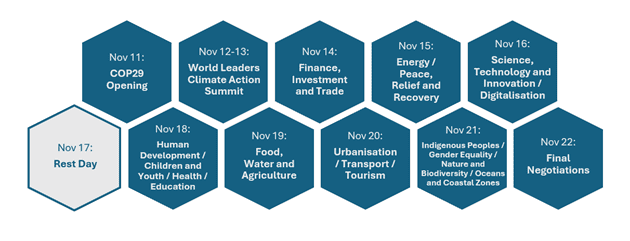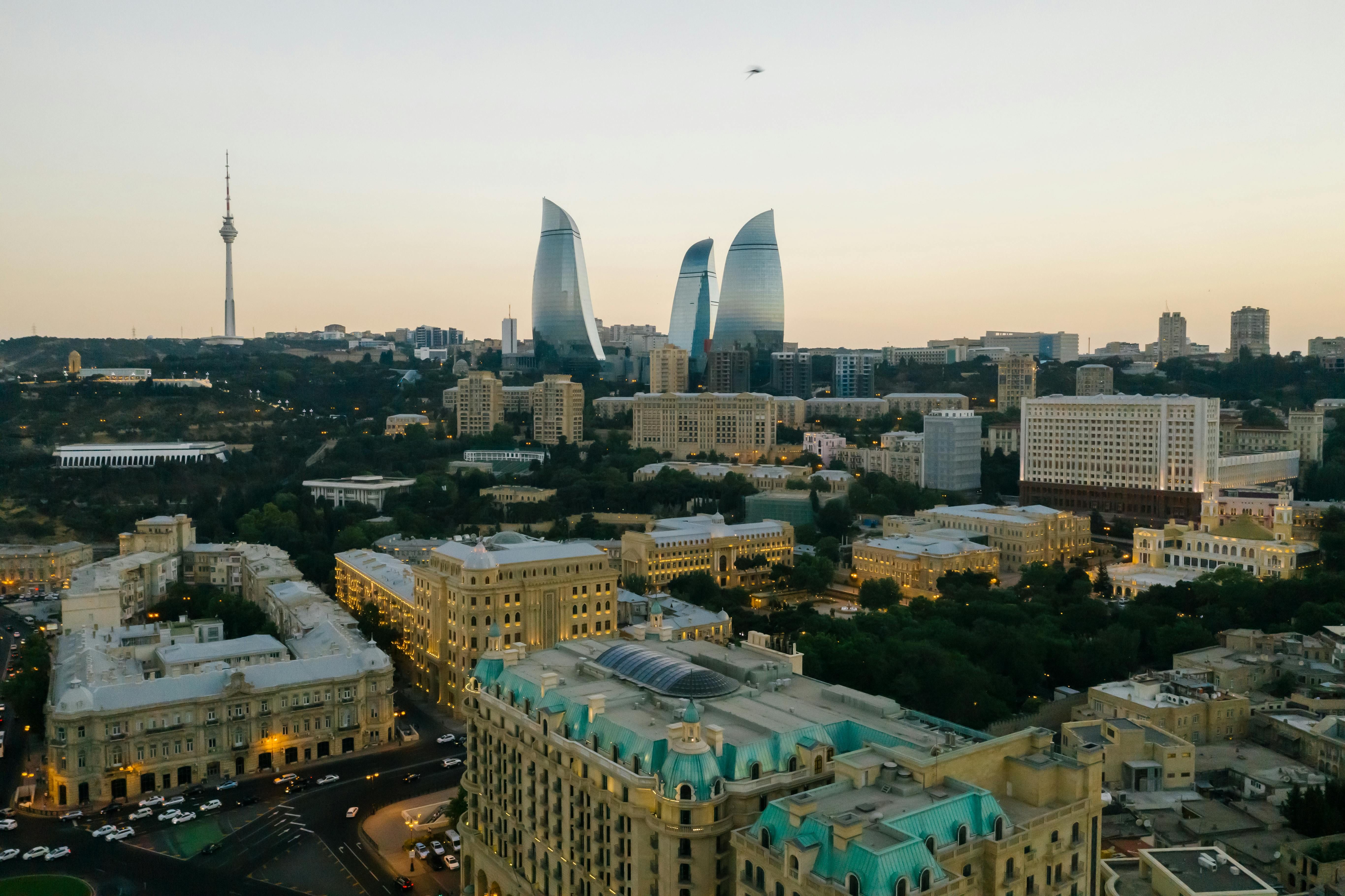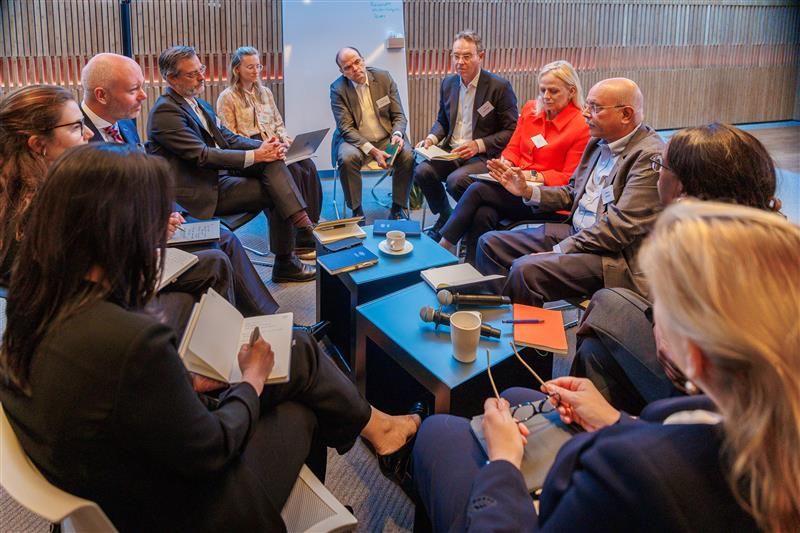The upcoming 29th United Nations Climate Conference (COP29) presents a critical opportunity for board directors to guide their organizations through the changing climate landscape. As 2030 approaches, when carbon emissions must decrease by 43% to meet the Paris Agreement goals, the urgency for action grows. COP29 will bring together nearly 200 nations in Baku, Azerbaijan, from November 11 to 22, 2024, to review progress and plan future actions for a just climate transition.
For corporate board directors, COP29 represents a key moment to align their organisations' strategies with global climate trends. It’s crucial for companies to not only comply with evolving regulations, but also seize new growth opportunities in sustainable markets.
Key Messages for Board Directors
- COP29's Focus on Climate Finance: As COP29 prioritizes new climate-finance goals, board directors must focus on how these commitments will impact corporate investment decisions. Blended financing models and public-private partnerships will be essential for supporting sustainability efforts.
- Global Political Trends and Corporate Strategy: With COP29 taking place in a historic election year, changes in government policies could influence international climate decisions. Directors should closely follow global political trends that may impact their business's value chain and climate commitments.
- Impacts on Governance, Investment, and Risk: The outcomes of COP29 will shape global regulations and financial mechanisms, directly affecting corporate governance, investment strategies, and risk management. Directors need to assess how these developments align with their companies’ decarbonization pathways and net-zero targets.
- Meeting Stakeholder Expectations: Stakeholders increasingly expect private sector contributions toward climate finance. COP29’s focus on advancing the Loss and Damage Fund and other financial tools will likely increase pressure on businesses to take a more active role in climate funding.
Key Actions for Board Directors
- Align Corporate Climate Strategies: Ensure your company’s sustainability strategies reflect updated Nationally Determined Contributions (NDCs) and comply with emerging global and national climate regulations. This is essential to maintaining corporate competitiveness in a rapidly changing regulatory environment.
- Explore New Climate Financing Opportunities: Take advantage of new climate finance tools introduced at COP29, such as the Loss and Damage Fund and carbon markets. These mechanisms can provide funding for climate adaptation and resilience projects, especially in emerging markets.
- Ensure Regulatory Compliance: With COP29 shaping key regulatory frameworks like carbon markets and climate reporting requirements, board directors should establish clear governance structures to ensure their companies comply with stricter climate regulations and avoid financial penalties.
- Foster Public-Private Partnerships: Collaborating with governments and other stakeholders is critical to achieving global climate goals. Board directors should actively engage in partnerships to scale up clean energy projects and enhance climate resilience across their supply chains.
- Invest in Innovation: The focus on digitalization and clean energy at COP29 offers significant investment opportunities. Directors should prioritize innovation, particularly in clean technologies and digital solutions, to future-proof their businesses.
Central Themes at COP29 of Importance to Board Directors
Climate Finance and Investment Strategy: One of COP29's central themes is advancing global climate finance, with a focus on setting new goals to mobilize funds, particularly for vulnerable countries. Board directors must evaluate how these financial commitments could create new opportunities for investment. The Loss and Damage Fund, for example, may offer businesses access to funding for climate projects. Directors should also explore how blended financing models—combining public and private capital—can support their sustainability efforts.
Carbon Markets and Regulatory Compliance: COP29 aims to finalize guidance for operationalizing Article 6 of the Paris Agreement, which governs carbon markets. Directors must assess how their companies participate in these markets, including understanding potential risks from stricter regulations or pricing mechanisms and identifying opportunities to capitalize on carbon credits. The evolving regulatory landscape around carbon markets will play a significant role in shaping how businesses manage climate risks and opportunities.
Clean Energy Transition: COP29 will focus heavily on closing the ‘ambition gap’ in delivering the energy transition. This is a key area for board directors to lead discussions on scaling up clean energy investments. The COP29 Global Energy Storage Pledge, for instance, sets ambitious targets to increase global energy storage capacity sixfold by 2030, offering significant opportunities for companies to invest in emerging technologies and infrastructure upgrades.
Human Development and Sustainability: COP29 also emphasizes the importance of human development, particularly in the areas of workforce development and climate resilience. Directors should ensure that their organizations invest in building sustainable and resilient human capital, especially in emerging markets. Partnerships with local communities and governments to promote climate-resilient practices can enhance both environmental impact and corporate reputation.
Public-Private Cooperation: Public-private cooperation will be a core theme at COP29. Directors should actively seek opportunities to collaborate with governments and other stakeholders to co-develop climate resilience projects, particularly in emerging markets. Engaging in these partnerships can help businesses drive innovation and scale up clean energy solutions, positioning them as leaders in sustainability.
Digitalization and Innovation: The first-ever Digitalization Day at COP29 highlights the role of technology in accelerating climate action. Directors should explore how digital tools can improve sustainability efforts and reduce environmental impacts, such as energy consumption and e-waste. Innovation in digital technologies will be crucial for businesses to remain competitive and adapt to the demands of a low-carbon economy.
Summary of Key Actions for Board Directors
- Align climate strategies with updated NDCs and international climate policies.
- Explore new financing opportunities from climate finance mechanisms and carbon markets.
- Ensure compliance with evolving climate regulations to mitigate financial and reputational risks.
- Foster public-private partnerships to scale up clean energy and climate resilience projects.
- Invest in innovation, particularly in digitalization and clean technologies, to futureproof the business.
COP29 Engagement Opportunities for Board Directors
Board directors attending COP29 can engage through various events in the Blue Zone (formal negotiations) and the Green Zone (for NGOs, civil society, academia, and business). Key events include:
- The World Climate Summit: A space for businesses, financial institutions, and decision-makers to share best practices and innovations that can drive further climate action.
- The Pavilion for Climate Leadership: Hosted by the We Mean Business Coalition, this pavilion will provide a platform for businesses to voice their climate commitments and engage with policymakers.
Conclusion
As COP29 approaches, board directors must focus on aligning their companies with evolving climate regulations, seizing new investment opportunities, and ensuring their businesses are prepared for the global transition to a low-carbon economy. By taking a proactive role in shaping corporate sustainability strategies, directors can position their companies as leaders in climate action and secure long-term growth.
Annex 1. Key Information on COP29 for Business Leaders
What is COP?
The Conference of the Parties (COP) is the United Nations Climate Conference held annually to discuss and accelerate global climate action at the international, regional, national, and local levels.
At COP, country representatives monitor and strengthen the implementation of the Paris Agreement, which aims to limit global warming to 1.5°C. The conference also provides a platform for collaboration on climate finance, clean energy, and sustainability initiatives, with both the public and private sectors playing crucial roles.
What is COP29?
COP29 is the 29th meeting of the Conference of the Parties, taking place in Baku, Azerbaijan, from November 11 to 24, 2024. It marks the first COP hosted in the Caucasus region and will bring together nearly 200 nations to discuss strategies for accelerating global climate action.
The core focus of COP29 includes:
- Reviewing progress made since the Paris Agreement and setting new climate action targets. This aligns with the updating of Parties’ Nationally Determined Contributions (NDCs) by 2025, also referred to as NDCs 3.0, to ensure that national commitments are not only in line with the levels of climate action needed to deliver Paris Agreement goals, but also properly funded and deliverable.
- Addressing climate finance, particularly through mechanisms like the Loss and Damage Fund and blended financing models to help developing countries.
- Finalizing the operationalization of carbon markets under Article 6 of the Paris Agreement.
- Accelerating the global energy transition by scaling up clean energy technologies, infrastructure, and investments.
- Strengthening public-private sector cooperation to ensure global alignment between policy and corporate efforts in achieving net-zero targets.
At the previous COP28, held in Dubai in November-December 2023, Parties marked the conclusion of the first UN Global Stocktake. The Global Stocktake (GST), which assesses countries’ progress on climate action over five-year periods and overall alignment with the goals of the Paris Agreement, has been described by the UN as “a critical turning point when it comes to efforts to address climate change”. COP28 also saw the agreement of the UAE Consensus, which calls on Parties to transition away from fossil fuels. Determining the financing required to deliver this transition is set to be front of focus at CO29.
What will COP29 negotiations focus on?
COP29 negotiations will focus on several critical themes to advance global climate efforts:
- Climate Finance: Setting the New Collective Quantified Goal on Climate Finance (NCQG), which aims to mobilise the funds necessary to support developing countries in accelerating climate action post-2025.
- Key points of negotiation are expected to include determining what aspects of climate action the goal should cover, how ambitious it should be, who should pay for it and according to what delivery timescales, as well as what transparency mechanisms can be put in place to ensure its delivery.
- Energy Transition: Addressing the gaps in the rollout of clean energy technologies and setting targets for energy storage and infrastructure upgrades.
- COP29 Green Energy Zones and Corridors Pledge to include targets to promote investment, stimulate economic growth, develop, modernise and expand infrastructure, and foster regional cooperation.
- COP29 Global Energy Storage and Grids Pledge with a target to increase global energy storage capacity six times above 2022 levels, reaching 1,500 gigawatts by 2030. The pledge will also commit to significantly scaling up investments in adding or refurbishing more than 80 million kilometres of grid infrastructure by 2040.
- Carbon Markets: Establishing clear rules for carbon trading and cooperation between countries to meet climate targets through carbon credit mechanisms, with particular emphasis on establishing consensus on Article 6 of the Paris Agreement’s rules.
- Previous COP28 negotiations, as well as those at the Bonn intercessional climate talks earlier in the year, have shown the difficulty in reaching agreement on the technical aspects of carbon market-based systems, thus, COP29’s goal of resolving Article 6 technical issues is a welcome priority. During pre-COP meetings in October, a new UN mechanism was agreed—the Paris Agreement Crediting Mechanism—which sets out standards for the UN carbon market’s crediting methodologies. This development sets the stage for more practical COP29 discussions around what its implementation means for countries’ carbon market practices.
- Public-Private Cooperation: Strengthening partnerships between governments and businesses to scale up climate resilience and clean energy projects.
- Advancing cross-sectoral synergies through initiatives including the Baku Initiative on Climate Finance, Investment and Trade (BICFIT) and Baku Global Climate Transparency Platform (BTP).
- Human Development: Highlighting the role of workforce development, education, and health in addressing climate change, particularly in vulnerable regions.

Figure 1. COP29 Thematic Program
How Can Businesses Engage at COP29?
Businesses play a critical role at COP29, engaging through various events, partnerships, and discussions. Corporate board directors and their organizations can participate in the following ways:
- Attending COP29 Events: Businesses can engage through events in both the Blue Zone (formal negotiations) and the Green Zone (non-state actors, including civil society, academia, and business).
- The World Climate Summit: This event offers a space for businesses, financial institutions, and decision-makers to share innovations and best practices that can drive climate action. It is an opportunity for businesses to influence climate negotiations and build partnerships.
- The Pavilion for Climate Leadership: Hosted by the We Mean Business Coalition, this pavilion provides a coordinated business voice to COP29, enabling companies to showcase their leadership in driving climate action and collaborate with policymakers.
- Policy Engagement: Many businesses also participate in policy engagement through lobbying groups and advocacy efforts to shape discussions around climate financing, carbon markets, and sustainable business practices.
By attending and engaging with these events, businesses can directly influence the global climate agenda, explore new investment opportunities, and demonstrate their commitment to sustainability.
Blue Zone
|
Green Zone
|
Stay informed on key COP29 outcomes
Keep up to date by following COP29 news from the World Economic Forum, the We Mean Business Coalition, the World Resources Institute, and the Climate Governance Initiative.
In the lead up to COP29, the Climate Governance Initiative will host a webinar on Key Outcomes for Boards from COP16 on 5 November , which will offer insights into the priorities for the climate COP and how to ensure nature is firmly on the agenda. There will also be further analysis in the Climate Governance Initiative’s post-COP29 briefing for board directors, which will be preceded by a COP29 wrap-up webinar for board directors on 5 December 2024.
A number of Climate Governance Initiative Chapters will also be holding relevant events throughout the COP period, which you can learn more about on the Climate Governance Initiative’s website.
Annex 2. Pre-COP29 events that set the tone for the negotiations
Key events in 2024 relevant to COP29 are described below. Together, these events underscore the need for continued focus on ambition and action across all fronts. COP29 is an opportunity to further pave the path forward with increased and more consolidated global collaboration.
Bonn Climate Change Conference (SB60) – understanding the challenge ahead
Leaders came together in June 2024 for the 60th biannual sessions of the UNFCCC subsidiary bodies (SB60), including the Subsidiary Body for Implementation, and the Subsidiary Body for Scientific and Technological Advice. This year’s sessions highlighted significant challenges in determining how global climate financing needs can be delivered. From discussions on assessing climate adaptation, to carrying forward the outcomes from COP28’s stocktake, financial disputes were front and centre.
UN Conference on Biological Diversity (COP 16) – spotlighting nature and biodiversity
- Held between 21 October and 1 November 2024 in Cali, Colombia
- Reviewing the state of the implementation of the Kunming-Montreal Global Biodiversity Framework.
- Parties are expected to show alignment of their National Biodiversity Strategies and Action Plans (NBSAPs) with the Framework.
- Finalize and operationalize the multilateral mechanism on the fair and equitable sharing of benefits from the use of digital sequence information on genetic resources.
- Related nature-focused events this year include the March 2024 Accelerating Nature-Based Solutions Conference in Zambia
79th UN General Assembly (UNGA) – accelerating global SDG delivery
In September, over 193 Member States came together for the annual UN General Assembly in New York, where the spotlight was on ensuring the Sustainable Development Goals (SDGs) are on track for delivery. With just five years left to achieve the SDGs, the summit acknowledged the urgent need for innovative ways to mobilize private capital to deliver the sustainable development agenda. Members agreed to economic justice pledges, including a promise to overhaul existing international financing architecture so that developing countries with significant debt burdens can pursue investment in development, while not being impeded by debt repayments. In looking towards COP29, world leaders adopted a Pact for the Future, which represents the most wide-ranging international agreement in many years.
Climate Week New York City – framing the climate finance agenda
During Climate Week New York City (CWNYC), the World Economic Forum convened a number of Sustainable Development Impact Meetings, bringing together the international development community and private and public financial stakeholders to identify ways to mobilize private capital further to support the 2030 agenda. Two headline reports were launched: Scaling nature finance now: The opportunity for investors in Brazil and beyond, and the summary report Whole-of-society rallies to support strong national climate plans. There was also a consultation session on private sector contributions to the Baku Initiative for Climate Finance, Investment and Trade (BICFIT), which provided a pre-COP29 opportunity to set out the need for scalable investment and trade policies to complement updated NDCs.
The UN Climate Change High-Level Champion for COP29 was present at CWNYC, attending a range of discussions with indigenous communities, large industrial stakeholders, and businesses working on climate resilience. Two campaigns were launched: Climate Proofing Small and Medium Enterprises (SMEs) and Impact Makers, which offer practical platforms for businesses and other non-state actors to take the necessary steps towards increased climate action.



